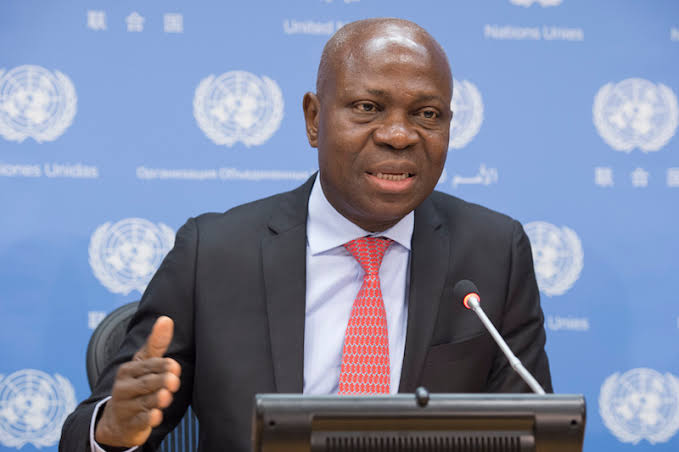African Countries Commit to Double Agricultural Productivity
A coalition of multilateral development banks and development partners has pledged over $17 billion in financing to address rising hunger on the African continent, and to improve food security. These funds were pledged on the final day of a two-day high-level dialogue called Feeding Africa: leadership to scale up successful innovations. The African Development Bank and the UN’s International Fund for Agricultural Development (IFAD) hosted the event in partnership with the Forum for Agricultural Research in Africa (FARA) and the CGIAR System Organization on 29 and 30 April.

Seventeen African heads of state signed on to the commitment to boost agricultural production by doubling current productivity levels through the scaling up of agro-technologies. This will include investing in access to markets, and promoting agricultural research and development. The various parties adopted a communiqué outlining these commitments at the end of the event.
Of the overall amount pledged, more than $10 billion came from The African Development Bank, which said it would invest $1.57 billion on scaling up 10 selected priority commodities over the next five years. This will help countries achieve self-sufficiency. Another $8.83 billion will go towards building strong value chains for these commodities over the next five years. This will include programs to create opportunities for young people – particularly women.
African Development Bank President Dr. Akinwumi A. Adesina said: “Let us now create today, a stronger partnership: a partnership for greater scale; a partnership to take technologies and innovations to hundreds of millions of farmers.”
The International Fund for Agricultural Development said it aimed to provide an additional $1.5 billion to support national efforts to transform food and agricultural systems in Africa over the next three years. IFAD will also invest more in creating the pre-conditions for increased agricultural productivity. The organization is helping to develop a growing pipeline of investments to restore land, create jobs and build resilience to climate change in the Sahel region. This will contribute to the Green Great Wall objectives, and will create 10 million jobs in the region by 2030.
Read also:Why South African Businesses Adopted Hybrid Cloud at Increasing Rate In 2020
IFAD President Gilbert F. Houngbo said: “We praise the African leaders’ commitment to increase agricultural productivity and improve food security for millions of Africans. By modernizing African agriculture, small-holder farmers will be in a better position to bring more affordable food to consumers and create decent livelihoods for millions of young Africans involved in the processing, storage and marketing of food.”
The Arab Bank for Economic Development in Africa (BADEA), committed up to $1.5 billion over the period 2020-2024 in agriculture. The Islamic Development Bank Group said it would earmark $3.5 billion to develop the agriculture sector in Africa in the next three years. It said these investments will develop commodity value chains for both staple food and cash crops.
In an additional show of solidarity, The Bill & Melinda Gates Foundation, joining a coalition of development partners, declared that it will invest $652 million in the next three years. This will support agricultural research and development initiatives in Africa. This funding is expected to empower 300 million farmers with a host of new innovations.
President Macky Sall of Senegal summed up interventions by African heads of state on Thursday with the following seven-point action list: Accelerate agricultural production by taking technologies to scale. Increase investment in research and development. Optimize technology. Improve business language in agriculture to open up to the world. Support access to markets and the installation of basic infrastructure and equipment.Invest in new businesses to transform agricultural produce to support small producers. Create a financing facility for food security and nutrition in Africa.
The forum communiqué reflected these action points, emphasizing the call for a financing facility for food security in Africa. It was felt that this would be an appropriate channel for scaling up climate resilience and successful agricultural technologies. It will include digital innovations to farmers across Africa, and will allow countries to better address malnutrition and stunting.
Sub-Saharan Africa has a quarter of the world’s arable land but only produces 10% of its agricultural output. The low productivity of staple crops makes African agriculture uncompetitive. As a result, the continent imports one-third of the calories that it consumes. This makes food systems more vulnerable and dependent on external food supply chains.
The outcomes from this week’s Leaders’ Dialogue will be communicated to the UN Secretary General as Africa’s commitments towards the UN Food Systems Summit in September this year. They will lay the foundation for Africa to present a unified voice to step up efforts and partnerships towards reaching the Sustainable Development Goals by 2030.
Kelechi Deca

Kelechi Deca has over two decades of media experience, he has traveled to over 77 countries reporting on multilateral development institutions, international business, trade, travels, culture, and diplomacy. He is also a petrol head with in-depth knowledge of automobiles and the auto industry





